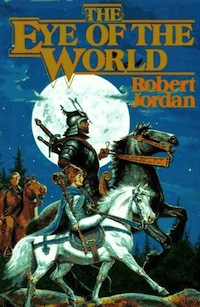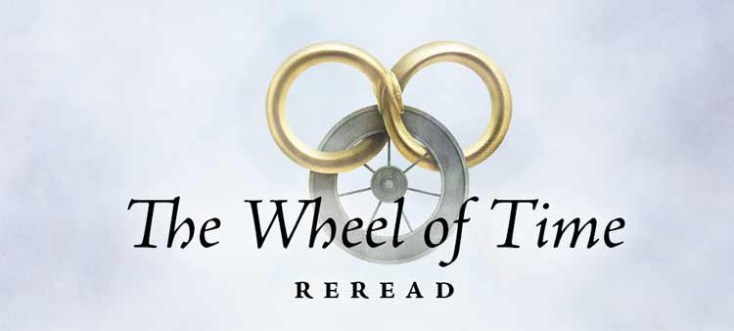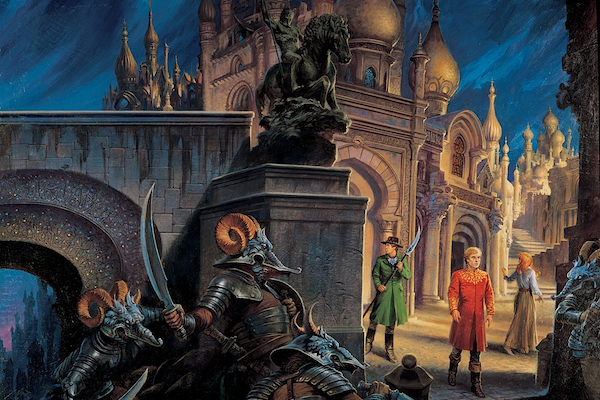Merry 2015, y’all! I usher in the new year with a sincere wish for everyone to please not freeze to death, because holy crap, and also with a new Wheel of Time Reread Redux!
Today’s Redux post will cover Chapter 25 and 26 of The Eye of the World, originally reread in this post.
All original posts are listed in The Wheel of Time Reread Index here, and all Redux posts will also be archived there as well. (The Wheel of Time Master Index, as always, is here, which has links to news, reviews, interviews, and all manner of information about the Wheel of Time in general on Tor.com.)
The Wheel of Time reread is also now available as an ebook series, except for the portion covering A Memory of Light, which should become available soon.
All Reread Redux posts will contain spoilers for the entire Wheel of Time series, so if you haven’t read, read at your own risk.
And now, the post!
 Chapter 25: The Traveling People
Chapter 25: The Traveling People
Redux Commentary
I’ve said this before in various ways, but I don’t think I will ever get the sheer extremity of Perrin’s wiggination over being able to talk to wolves. Not that I don’t think some amount of wigging isn’t valid, because sure, that would definitely be hella freaky and weird on multiple levels, not least in that it implies a lot more about the nature of Perrin himself than it does anything else. But even so, there’s no way I wouldn’t be simultaneously at least a little excited at the notion of being able to talk to wolves.
Because—because you’re talking to frickin’ wolves, man. How can you not find that at least a tiny bit cool?
Probably all this actually proves, though, is that if I were a character in a SFF/horror story, I would probably be the one who gets all inappropriately excited about things that much more appropriately freak out all the other characters, thus garnering me, the hypothetical inappropriately excited character, a variable number of (hilariously) incredulous looks from the rest of the cast.
But that’s okay. Those characters are usually my favorite ones, anyway. If such be my fate to be one, than so shall it be.
Perrin, then, is very emphatically not one of those characters, which meant I spent most of the series both enthralled at the coolness of his superpower and annoyed at him for not enjoying it as much as I was. Which is, objectively, pretty unreasonable of me, I freely admit, since I probably don’t really have the right to tell people, even fictional people, how much or how little they are allowed to freak out about things. To each their own level of neurosis, I always say. Or, well, actually I’ve never said that, but I’m saying it now, okay? Jeez.
So, fine, Perrin gets to be as obtuse and squirrelly about his really frickin’ cool wolf-whispering abilities as he wants. Fine. Doesn’t mean I won’t stop being irritated about it, though. So There.
Although (“And Another Thing!” she says), you’d think the whole part where Perrin realized that his Magical Mystical Lupine Connection was incidentally keeping Big Scary Evil Flame Guy out of his dreams would make him a tad more enthusiastic about the situation. But, I guess some people just have to look a gift psychic link to apex predators in the mouth. Pfeh.
(Also, “Magical Mystical Lupine Connection” is totally the name of my next retro-hippie psychedelic rock band. Just FYI.)
I also had some passing musings here about how (and why) the whole wolf-whispering thing started at this particular moment in the first place. Because obviously Perrin’s never wolf-whispered before this juncture, and yet judging from what Rand and other Duopotamians said earlier, having to deal with wolves occasionally making off with their livestock and such was a fairly common occurrence in Emond’s Field and thereabouts, especially lately. Ergo, it’s not like Perrin’s never been in the general vicinity of wolves before. So why did his ability never manifest before now?
The snarky answer, of course, is “because this is when the plot needed it to happen,” but if I’m going to not go there, then I suppose that maybe it is just that he was probably never as this up close and personal with wolves before. I can’t think of any other reason, so that’ll have to do.
Moving on!
“What if somebody attacks you?” Perrin insisted. “What if somebody hits you, or tries to rob you, or kill you?”
Raen sighed, a patient sigh, as if Perrin was just not seeing what was so clear to him. “If a man hit me, I would ask him why he wanted to do such a thing. If he still wanted to hit me, I would run away, as I would if he wanted to rob or kill me. Much better that I let him take what he wanted, even my life, than that I should do violence. And I would hope that he was not harmed too greatly.”
[…] “I don’t mean to offend you, Seeker,” Perrin said slowly, “but… Well, I don’t look for violence. I don’t think I’ve even wrestled anybody in years, except for feastday games. But if somebody hit me, I’d hit him back. If I didn’t, I would just be encouraging him to think he could hit me whenever he wanted to. Some people think they can take advantage of others, and if you don’t let them know they can’t, they’ll just go around bullying anybody weaker than they are.”
Ah, the eternal debate. I have semi-fond (okay, semi-irritated. Or both. Irrifond?) memories of going twelve rounds over this question with a self-declared pacifist back in the Usenet day.
The problem, I think, is that it’s a circular argument. Because yes, obviously it would be awesome if everyone embraced the Way of the Leaf and there was no more violence and we all danced and sang and wore horribly clashing color combinations forevermore, kumbaya, amen. Duh. But the problem is that you can never trust that resolution to hold on a universal level. Someone, somewhere, is always going to decide it’s easier to knock someone down and take their stuff rather than earning stuff of their own, and maybe it just points to the inherent violence in my soul or whatever, but I am simply not capable of viewing that as merely a cost of business rather than a wrong to be defended against—violently, if no other way will suffice.
And yes, it’s a cycle, and yes, it perpetuates itself, and yes, violence begets violence; the pacifists are absolutely right about that. I’m just not sure it’s a merry-go-round that it’s possible to actually get off of. You know?
“What was that about a song?” Egwene asked.
“That’s why they travel,” Elyas said, “or so they say. They’re looking for a song. That’s what the Mahdi seeks. They say they lost it during the Breaking of the World, and if they can find it again, the paradise of the Age of Legends will return.” He ran his eye around the camp and snorted. “They don’t even know what the song is; they claim they’ll know it when they find it. They don’t know how it’s supposed to bring paradise, either, but they’ve been looking near to three thousand years, ever since the Breaking. I expect they’ll be looking until the Wheel stops turning.”
So, so much sadder when you know that the “song” they’re looking for is something they’re just not going to find, ever. I was looking over the old WOTFAQ recently and the section on the Aiel had a quote from Aaron Bergman, ex-rasfwrjian, that summed it up: “I think one of the themes buried in these novels is that the past is dead. You can’t hope to regain the past. Rand can’t go back to the Two Rivers and become a shepherd. The Age of Legends is dead, it will not return for a very long time; certainly not in the next (Fourth) Age. The Tuatha’an are seeking to regain the past. The ’Song’ is a remnant of the past. Thus, the Song will not be found. There is no Song that will recreate the Age of Legends, for it is past.”
I suppose there’s a debate that could be had, then, whether the Tinkers’ quest, fruitless as we know it to be, was a good thing or a bad thing. On the one hand, logically knowing the truth is better than not knowing it. But on the other, we later see exactly what happens to the other offshoot of the Da’Shain (i.e. the much more stabby Aiel) when their entire raison d’être is yanked out from under them by The Truth, so maybe sometimes ignorance really is bliss. Or not. DISCUSS.
“As for the girl, she would not let anyone touch her, even to tend her wounds. But she seized the Seeker of that band by his coat, and this is what she said, word for word. ‘Leafblighter means to blind the Eye of the World, Lost One. He means to slay the Great Serpent. Warn the People, Lost One. Sightburner comes. Tell them to stand ready for He Who Comes With the Dawn. Tell them…’ And then she died.”
Still sort of curious how exactly these Maidens got this information. Did they interrogate a Trolloc? Overhear some Fades gossiping? Accidentally get put on the Darkfriends’ “Armageddon How To” weekly group email list? Inquiring Minds Wish To Know!
 Chapter 26: Whitebridge
Chapter 26: Whitebridge
Redux Commentary
Generally speaking, I like all the chapter icons used in WOT, but I think the harp icon in particular is one of my favorites. Something about how the stylized lines of it make it look like the harp itself is leaping and dancing to music. That’s just neat.
And over it all the White Bridge towered and shone.
“It looks like glass,” Rand said to no one in particular.
Captain Domon paused behind him and tucked his thumbs behind his broad belt. “Nay, lad. Whatever it be, it no be glass. Never so hard the rains come, it no be slippery, and the best chisel and the strongest arm no make a mark on it.”
That must be awful nice. Civil engineering was apparently way less stressful a profession in the Age of Legends. Forget worrying about things like wind shear or structural integrity or erosion or whatever; just design it to be super pretty, and then throw some Aes Sedai at your completely impractical structural flight of fancy to get it all cuendillarized up, and voilà.
(I mean, I’m assuming it’s cuendillar. I can’t remember if we ever got told in so many words that it was, but whatever; even if it isn’t, it’s something so close as to make no relevant difference.)
Aes Sedai work. One thing to hear about it, another to see it, and touch it. You know that, don’t you? For an instant it seemed to Rand that a shadow rippled through the milk-white structure.
Another really nicely subtle foreshadowing of Rand’s ongoing One Power Acquisition Syndrome.
“All in black he is. Keeps the hood of his cloak pulled up so you can’t see his face, but you can feel him looking at you, feel it like an icicle shoved into your spine. He… he spoke to me.” [Bartim] flinched and stopped to chew at his lip before going on. “Sounded like a snake crawling through dead leaves. Fair turned my stomach to ice. Every time as he comes back, he asks the same questions. Same questions the crazy man asked. Nobody ever sees him coming — he’s just there all of a sudden, day or night, freezing you where you stand.”
I’d forgotten about this detail, and now it seems a little weird to me that a Fade could actually pass as human enough to only freak people out. But then, maybe my perspective is warped by being so long at the other end of the story, by which time pretty much everyone alive knows exactly how to recognize a Fade. The incredible naïveté of just about everyone in TEOTW still knocks me for a loop sometimes.
Thom crashed into the Myrddraal before the black blade was half drawn, and both went down in a thrashing heap. The few people still in the square fled.
“RUN!” The air in the square flashed an eye-searing blue, and Thom began to scream, but even in the middle of the scream he managed a word. “RUN!”
Aw, Thom.
There was a bit of controversy over this passage back in the day, as I recall. Way back in the mists of the 1990s, Jordan had told former FAQueen Pam Korda (in response to a letter, no less, which strikes me as incredibly adorable and quaint now) that when a Fadeblade strikes Power-wrought metal, the reaction produces blue sparks. Which was puzzling, since this scene therefore implied that Thom’s daggers were Power-wrought, which seemed… odd.
When asked about this scene specifically later, Jordan said that the effect was not from Thom’s daggers, but produced “before Thom reached the Fade”, which… is not really possible, going from the wording of the text above. However, considering he said that after publishing the ninth book or thereabouts, I’m not really going to ding him for not remembering precisely how this one little passage from a decade earlier went. So maybe it was a gaffe to put in the bit about the blue flash, but it certainly seems like Jordan never intended to imply that Thom had special Power-wrought daggers.
The other thing people used to argue about regarding this scene was how exactly Thom actually survived the fight, since, well, he just freakin’ bum-rushed a Fade. A Fade wielding a Thakandar-wrought blade, to boot—wounds from which, we are later told, tend to kill their victims even when not fatal, unless capital-H Healing is applied. And yet Thom walked away from it with nothing more than a tricky knee, as he tells Moiraine later.
*shrug* I guess you don’t always have to be ta’veren to have insane amounts of luck, eh?
And that’s all for the nonce, folks! I hope everyone had as lovely a holiday season as I did, and I hope this helped ease alla y’all back into the January grind, too! See you next Tuesday!












